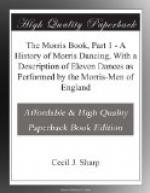Laudnum Bunches.
Bean Setting.
Constant Billy (3).
Blue-Eyed Stranger.
The Rigs o’ Marlow (2).
Old Mother Oxford.
The old Woman tossed up in
a blanket (2).
Jockie to the Fair.
Rodney.
How d’ye do?
Trunkles (4).
Country Gardens.
Brighton Camp (The Girl I’ve
left behind me) (2).
Shepherd’s Hey (3).
Bluff King Hal.
We won’t go home till
morning.
Princess Royal (2).
Heel and Toe.
Morris Off.
Green Sleeves.
Hey Morris.
The Cuckoo’s Nest.
Swag and Boney.
The Gallant Hussars.
The British Grenadiers.
The Vicar of Bray.
The Sherborne Jig.
Belle Isle’s March.
Two Derbyshire tunes ("This
is it, and That is it.”)
It must be remembered that our investigations have up to the present been confined within a limited area, and that we have not yet attempted to deal with the northern counties of England. The experience, however, that we have already acquired is enough to prove that there are a much larger number of traditional Morris tunes still to be found in country districts than most people would imagine. Unfortunately, many Morris sides have been disbanded within the last two or three decades, and our field of work is therefore becoming more and more restricted; for it is difficult, and in many cases impossible, to acquire accurate information unless the Morris side is actually in being. We intend, however, to continue our inquiries without pause, in order that we may collect all the existing tunes and other information upon this most interesting subject before it is too late.
We append some notes on the tunes which we are publishing in connection with this volume, with the exception of “Bean Setting,” “Trunkles,” and “Laudnum Bunches,” about which we know nothing.
NOTES ON MORRIS TUNES.
“How d’ye do?”
Compare “Blowzabella, my bouncing Doxie,” in d’Urfey’s “Pills to purge melancholy,” I., p. 190 (Ed. 1719).
“Rigs O’ Marlow.”
This air is printed in Burke Thumoth’s collection of Irish Airs (1720), in Holden’s “Old Irish Tunes” (1806), and in “Songs of Ireland,” p. 164 (Boosey).
T. Crofton Croker quotes the words of the original song in “The Popular Songs of Ireland” (1839), of which the first verse is as follows:—
Air—“Sandy
lent the man his Mull.”
Beauing, belling,
dancing, drinking,
Breaking windows,
damning, sinking,
Ever raking, never
thinking,
Live
the rakes of Mallow.
Mr. Kimber, the leader of the Headington Morris, could only give us the first verse of their song, which, however, is quite different from the Irish words:—
When I go to Marlow Fair
With the ribbons in my hair,
All the boys and girls declare,
Here comes the rigs o’
Marlow.




